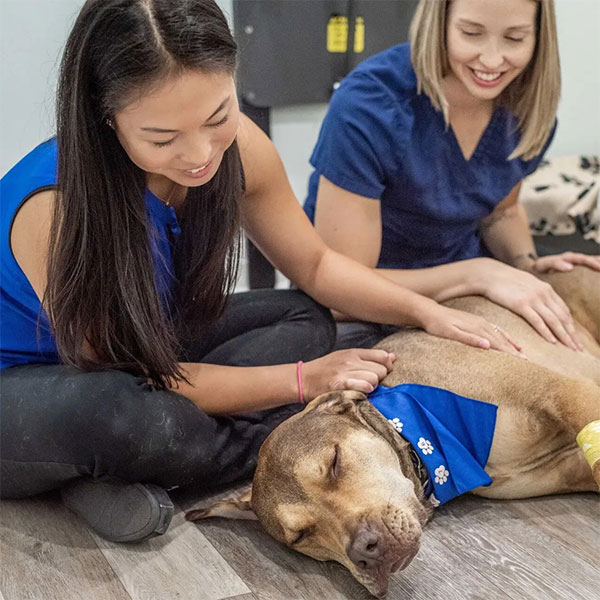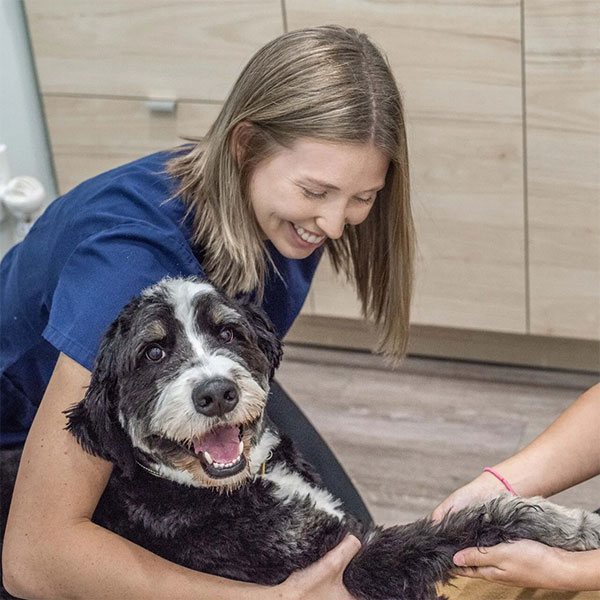MEDICAL SERVICES
Your pet is your best friend and beloved family member. To keep your best friend feeling their best, we utilize a range of medical techniques that help us assess, diagnose, and treat a variety of medical conditions.
This means whether your pet is struggling with a skin condition, upset stomach, lethargy, or something else, we have the tools, techniques, and expertise required to help them feel better. We will do our very best to help your pet recover or to manage their symptoms in the long term.
Our focus is always on your pet and their well-being. Throughout the entire process of examination, treatment, surgery (if required), and aftercare, your family, both two and four-legged, will be cared for and supported.


Our knowledgeable team can help provide treatment across a number of fields, including:
- Heart and respiratory health
- Skin conditions
- Urinary issues
- Hormone imbalances and disorders
- Eye complaints
- Problems with bones and joints
- And more
This is such a key part of what we provide to pet owners. We know how difficult it is to trust someone else with the health and safety of your pet, so we repay that trust with genuine care and attention. You can find out more about each of these medical services on our website or by reaching out to book an appointment with our team.
Skin disorders and allergies are often frustrating life long conditions. We are not here to promise you a “quick and easy” fix. We are here to listen and thoroughly assess your pet from their condition to their lifestyle and diet to their previous response to treatments. We are here to look for the underlying cause of your pet’s itchy skin/ recurrent ear infections/ flaking skin. We strive to not only relieve your pet’s current symptoms but to be your resource and support system for living with a pet with skin issues.
We provide a detailed discussion and physical exam for all patients. There are times we may recommend and discuss further diagnostic testing such as skin scrapings, fungal or bacterial culture, allergy testing, hormonal testing and biopsies to diagnose an underlying cause and target our therapeutic plan.
Our approach to treating skin conditions is multi-modal. We will utilize a variety of treatments from shampoos, wipes, sprays and medication to target the different factors contributing to your pet’s discomfort.
Our goals are to:
Pinpoint the underlying cause of your pet’s condition
Create a customized treatment plan for your pet’s current symptoms
Create a long-term management plan to decrease the frequency and severity of flare-ups
Don’t let your beloved companion suffer another itchy moment. Click here to learn more and take the first step towards helping your pet live a more comfortable life.
We are proud to offer an in-house laboratory, dental and full body X Rays and an ECG machine. Comprehensive in-house diagnostics allow us to receive your pet’s results sooner, all at the same location.
X-rays are often associated with diagnosing broken bones, however, there is so much more we can learn about your pet’s condition from radiology.
X-rays help us assess the condition of your pet’s:
- Digestive system, including the stomach, liver and intestines
- Heart and lungs
- A variety of other abdominal organs, including the kidneys, bladder and the prostate
- The oral cavity, especially the teeth and surrounding structures.
- Joints and bones
- The spine.
Radiographs can be captured quickly and painlessly, so you don’t need to worry about stressing out your pet. In some cases, sedation or anaesthesia may be required, and our veterinarian will discuss this with you ahead of the procedure. Modern x-ray technology also produces far less radiation than older machines, so you can rest assured that the procedure is safe for your pet.
Once we have completed the x-ray, we’ll get the images almost instantly so we can start examining your pet’s results. In complex cases, we do also have the opportunity to send images to a radiologist for a specialist opinion.
Whether we are diagnosing illness or ruling out possible causes of disease, x-rays are an extremely valuable diagnostic tool in the treatment process.
These glands are found in many areas throughout the body, including:
- The skin
- The heart
- The liver and kidneys
- The digestive tract
- The brain
- The reproductive systems of male and female pets
These glands are pretty small, but they have a big, big effect on the mood, physical condition, metabolism, psychological health, and general well-being of your pet!
There are many different disorders associated with endocrine gland abnormalities. In order to understand more about the condition of your pet, we will carry out a full consultation and examination. We may also recommend further diagnostics like blood work and diagnostic imaging, which will give us more insight into the required treatment.
Some common endocrine disorders include:
- Hyperthyroidism, when levels of thyroid hormones are too high
- Hypothyroidism, when levels of thyroid hormones are too low
- Diabetes, usually when insulin hormone levels are too low
- Cushing’s syndrome, when levels of the cortisol hormone are too high
- Addison’s disease, when the adrenal glands are not producing adequate amounts of steroid hormones
Common symptoms of endocrine disorders to watch out for include:
- Changes to the pet’s coat
- Changes to their appetite and thirst levels
- Weight loss or gain
- Increased lethargy
If you notice any of these symptoms, please contact us to schedule an appointment for your pet.
We will discuss not only your pet’s nutrition requirements but also your concerns about pet nutrition. A large component of this is eudcation and learning about the intricacies of pet nutrition. We will discuss how to ensure your pet’s diet is nutritionally complete and balanced, feeding for your pet’s life stage and if necessary, seek advice from veterinary nutritionists to recommend diets for your pet’s medical conditions.
As your pet’s primary health care provider, we are here to help you choose the right diet for your pet. If you have any questions about your pet’s diet, please do not hesitate to contact us.
– Association for Pet Obesity Prevention
Our weight management program is designed to give you the tools to keep your pet looking and feeling their best. Our program includes the following steps:
- Education. Our team will teach you how to assess your pet’s body condition and determine which diet is best for your pet.
- Nutrition advice. Every pet’s nutritional needs are different. Our team will give you guidance throughout your pet’s weight loss journey until they reach their healthy weight goal.
- Monthly weight checks. Monthly weight checks help us continuously assess your pet’s progress. This allows us to provide guidance on food portions, helps us measure your pet’s success and prevents weight loss plateaus.
Our team is passionate about preventative health care, by providing your pet with the right nutrition you can make sure your best friend stays your best friend for longer. Now that’s some incentive to start counting your pet’s kibble!
While you may associate heart problems with older dogs and cats, these issues can affect animals of all ages. This is why cardiology plays such an important role in veterinary testing and treatment.
Our team can assess your pet’s cardiac health by examining:
- Abnormal heart sounds (murmurs) which could be associated with
- Abnormal rhythm of the heartbeat (arrhythmia)
- Changes in your pet’s behavior at home such as recent lethargy or coughing
- Your pet’s blood work results
- The electrical function of the heart by an ECG
- The shape and size of the heart by x-rays
- The stucture and blood flow of the heart by cardiac ultrasound
Identifying a problem early gives us the best chance of successful treatment or managing the symptoms to give you more great years together. We have several different methods, from comprehensive physical examinations to X-rays and ultrasound testing to get to the bottom of the problem, and then to decide on the best course of action for your pet.
If your pet seems to have lost their appetite, is coughing, is getting out of breath easily, or is not as active as they used to be, this could be a sign of cardiac disease. Contact our team if you have any concerns about your pet’s health.
These sound waves bounce back off different tissues and materials within the body. The reflected waves are then used to build a picture of what is going on inside. There is no radiation involved — only totally harmless sound waves.
When using ultrasonography to see inside your pet we can examine the following:
- The health of tendons and ligaments.
- The structure and blood flow of the heart.
- The health of your pet’s internal organs such as the stomach, intestines, liver and spleen.
- Examine the bladder and reproductive tract.
- The presence of foreign objects that may have been swallowed or otherwise ended up inside your pet.
Your pet might be a bit curious about what’s going on but it is pain free and a wonderful non invasive diagnostic tool.

